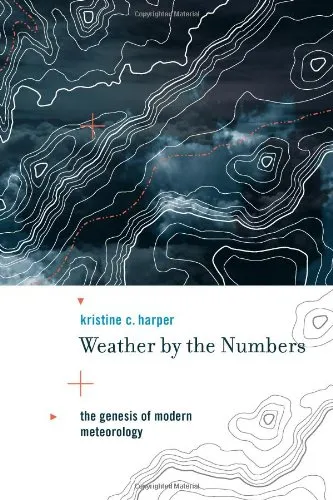Weather by the Numbers: The Genesis of Modern Meteorology (Transformations: Studies in the History of Science and Technology)
4.5
Reviews from our users

You Can Ask your questions from this book's AI after Login
Each download or ask from book AI costs 2 points. To earn more free points, please visit the Points Guide Page and complete some valuable actions.Introduction to "Weather by the Numbers: The Genesis of Modern Meteorology"
"Weather by the Numbers: The Genesis of Modern Meteorology" explores the transformative journey of meteorology from a descriptive and observational science to an analytical, mathematical, and highly systematic discipline. Written by Kristine C. Harper, this book is a profound look into the 20th century’s scientific, technological, and institutional innovations that profoundly shifted how humanity understood and predicted the weather. Part of the renowned "Transformations: Studies in the History of Science and Technology" series, this work delves into the collaborative efforts between scientists, governments, and the military to shape modern meteorology.
Harper provides an intriguing investigation of the discipline’s transition from traditional approaches like satellite observations and pattern recognition to the sophisticated use of numbers, computer models, and algorithms. Readers are invited to explore how the Second World War and the Cold War created a fertile environment for technological advancements that revolutionized the discipline.
The book is a compelling resource for historians of science and technology, meteorologists, and anyone captivated by the intersection of science, technology, and society. It sheds light on the confluence of politics, personal ambition, and unprecedented challenges that ultimately made weather prediction a critical pillar of modern science.
Detailed Summary of the Book
The narrative of "Weather by the Numbers" is divided into several key sections, each meticulously weaving together technological breakthroughs and their socio-political implications. The book begins by examining the pre-modern state of meteorology, where predictions relied on empirical observations and heuristics. Readers are provided with vivid depictions of a time when weather prediction was largely seen as impractical and often inaccurate.
Harper transitions to the advent of numerical weather prediction, emphasizing the pivotal role played by pioneers like Vilhelm Bjerknes and Lewis Fry Richardson. She illustrates how Richardson’s vision of using mathematical equations to simulate atmospheric processes faced initial resistance, only to later become foundational with the emergence of computers.
A significant portion of the book focuses on the instrumental role of military and state institutions during World War II and the Cold War. Harper discusses how meteorology became a strategic priority, leading to increased funding, the establishment of weather agencies, and the development of advanced computational tools. The book concludes by considering the global implications of these advancements, including their impact on aviation, military operations, and climate research.
Key Takeaways
- The transition from descriptive to analytical meteorology paved the way for modern predictive models.
- Numerical weather prediction became viable only through the advent of computers and state funding.
- Military needs and Cold War geopolitics played a crucial role in driving advancements in meteorological science.
- Collaboration between scientists, engineers, and institutions was pivotal in redefining meteorology.
- The development of mathematical models laid the groundwork for current climate science and weather forecasting systems.
Famous Quotes from the Book
"The transfer of meteorology from an art to a science was neither inevitable nor universally embraced; it required vision, investment, and a willingness to experiment."
"The tools of modern meteorology were forged in the fires of wartime necessity and political ambition, revealing the intrinsic connections between human conflict and scientific progress."
Why This Book Matters
"Weather by the Numbers" is more than a history of meteorology—it is a case study in how science evolves within the context of broader societal demands. Meteorology, now a cornerstone of daily life and governmental decision-making, owes its modern incarnation to the intricate interplay of individuals, technology, and institutions during key moments in history.
For students, historians, and scientists, this book serves as a testimony to the power of collaboration and innovation in shaping a scientific discipline. Kristine C. Harper masterfully demonstrates that the weather forecast we take for granted today is the result of decades of strategic planning, scientific commitment, and intellectual courage. In an era where climate change looms large, understanding the genesis of meteorology provides valuable insights into the scientific and institutional underpinnings of modern environmental studies.
Free Direct Download
You Can Download this book after Login
Accessing books through legal platforms and public libraries not only supports the rights of authors and publishers but also contributes to the sustainability of reading culture. Before downloading, please take a moment to consider these options.
Find this book on other platforms:
WorldCat helps you find books in libraries worldwide.
See ratings, reviews, and discussions on Goodreads.
Find and buy rare or used books on AbeBooks.
1293
بازدید4.5
امتیاز50
نظر98%
رضایتReviews:
4.5
Based on 0 users review
"کیفیت چاپ عالی بود، خیلی راضیام"


